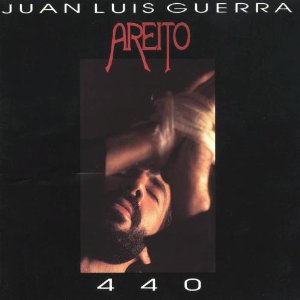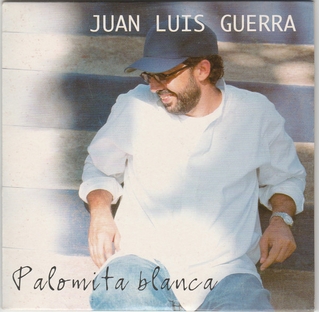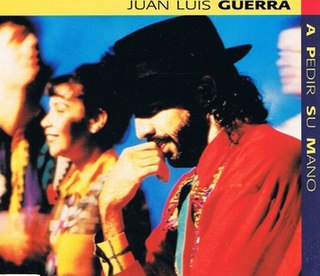Related Research Articles

Juan Luis Guerra Seijas is a Dominican musician, singer, composer, and record producer. He has sold 30 million records worldwide, making him one of the best-selling Latin music artists. Throughout his career, he has won numerous awards including 23 Latin Grammy Awards, three Grammy Awards, and one Latin Billboard Music Award. Guerra won 3 Latin Grammy Awards in 2010, including Album of the Year. In 2012, he won the Latin Grammy Award for Producer of the Year.

La Llave de Mi Corazón is the 10th studio album recorded by Dominican singer-songwriter Juan Luis Guerra, It was released by EMI Televisa Music on March 20, 2007. It was Guerra's first album to contain a songs in english since his 1994 recording of Fogarate. The album contains fusions of mambo and tropical rhythms that Guerra himself defined as "Mambo merengue". Its production and musical structure of album is based on merengue, bachata and salsa and encompasses elements of Blues, Son, Jazz, Mambo and Bossa Nova. The album was written, arranged and produced by Juan Luis Guerra and according to the artist is his most romantic album. It is composed of four merengues, two bachatas, three romantic songs and two salsas.

Bachata Rosa is the fifth studio album by Dominican singer-songwriter Juan Luis Guerra and his group 4.40. It was released on December 11, 1990, by Karen Records. It brought bachata music into the mainstream in the Dominican Republic and gave the genre an international audience. A Portuguese version of the record was released in 1992 under the title Romance Rosa; it was certified gold in Brazil. The album received a Grammy Award for Best Tropical Latin Album and two Lo Nuestro Awards for Tropical Album of the Year and Tropical Group of the Year.
Homenaje a Juan Luis Guerra is the second studio album from Cuban singer Marlon. The album is a tribute to Dominican merengue singer Juan Luis Guerra, and features salsa cover of some of his songs.

Ojalá Que Llueva Café is the fourth studio album by Dominican singer-songwriter Juan Luis Guerra released in 1989 by Karem Records. It is considered one of his most emblematic and important albums. The album set the musical path for his later albums, re-formulating Dominican merengue and bachata music through the contemporary elements of pop, rock, salsa, or jazz. Incorporating socially conscious lyrics with danceable merengues and romantic-poetic bachatas, the album is considered one of the most important albums of his discography.

Fogaraté! is the seventh album of the famous Dominican songwriter and musician Juan Luis Guerra. It was released on July 19, 1994. The album mixed a variety of music genres including rural and flolklroic rots of merengue called "Perico Ripao" with elements of African soukus music and Tropical Music such as Reggae with the collaboration of African guitarist Diblo Dibala and Dominican accordionist Francisco Ulloa, along with Son, Bachata and Salsa. Also, the album features a particular, bachata-styled adaptation of the Lacrimosa movement from Mozart's Requiem Mass in D Minor and Guerra's first song fully in English "July 19". Exploring lyrics and themes about magical realism of Latin American literature and commenting on the politics of the Caribbean, for many fans and critics, Fogaraté! is one of his most musically complex album.

Areíto is the sixth album by Juan Luis Guerra with his band 440, released on December 8, 1992, by Karem Records. The album, meant to be a tribute to the indigenous tribes of the Dominican Republic, is named after a dance that the aboriginal inhabitants of the Greater Antilles (Taínos) accompanied with songs during their festivals and religious rites. The album contains twelve tracks including "Cuando te Beso", interpret by Santo Domingo Philharmonic Orchestra. Congolese musician Diblo Dibala played guitar on the song "El Costo de la Vida", which was a Spanish cover of his own soukous song "Kimia Eve", while the last track on the album, "Naboria daca, mayanimacaná", is sung in Arawak, the language of the Taíno people. Areíto was originally set to be released in early April 1992, but was first delayed to the end of October 1992 and was finally released on December 8, 1992.

"Mi PC" is a song by Dominican Republic singer-songwriter Juan Luis Guerra and his band 4-40 from his eighth studio album, Ni Es lo Mismo Ni Es Igual (1998). The song was released as the lead single from the album in November 1998 by Karen Records. The song was written and produced by Guerra. It is a pop merengue track in which Guerra uses computer terminology to narrate a love story. "Mi PC" was met with positive reactions from music critics who found the lyrics to be clever and its music catchy.

"Palomita Blanca" is a song by Dominican Republic singer-songwriter Juan Luis Guerra and his band 4-40 from his eighth studio album, Ni Es lo Mismo Ni Es Igual (1998). As with the rest of the album, the song was written and produced by Guerra. The song was released as the second single from the album in March 1999 by Karen Records. It is a bachata acoustic ballad about a man who is immensely in love with a woman and refuses to let her go.
"El Niágara en Bicicleta" is a song by Dominican Republic singer-songwriter Juan Luis Guerra and his band 4-40 from his eighth studio album, Ni Es lo Mismo Ni Es Igual (1998). The song was written and produced by Guerra. It was released as the third single from the album in 1999 by Karen Records. A merengue rap song, it sees the protagonist finding himself in a hospital that is in poor condition, based on Guerra's experience in one. The song received positive reactions from three music critics, who praised who praise its music and social conscious lyrics.

Grandes Éxitos de Juan Luis Guerra y 440 or simply Grandes Éxitos is a compilation album of Dominican singer-songwriter Juan Luis Guerra, and his band 440 released in July 1995 by Karem Records. It contained Guerra's fifteen biggest hits from 1988 to 1994 on the original version and from the albums Mudanza y Acarreo(1985) to Fogarate! (1994) on the international versions. The compilation receive positive reviews by the critics.

Colección Romántica is the compilation album of the famous Dominican songwriter and musician Juan Luis Guerra and 4.40. It was released in November 21, 2000 and February 6, 2001 in the United States by Karen Records.It is a dual album compilation including 20 of the group's classic songs remastered and re-recorded as ballads. The album also contained unaltered original versions of their softer songs, like acoustic ballads or bachatas. It would become Guerra's last album released under the Dominican independent music label Karen Records, as his later albums would be released under Vene Music and subsequently under EMI music and Capitol Latin.
The Dominican singer, songwriter and producer Juan Luis Guerra has released 14 studio albums, two live albums and forty-eight singles. He is one of the best selling Latin artist of all time with more 30 millions of records worldwide. He made his debut with his first studio album Soplando, released in 1984. He later released his second studio album in 1985, Mundanza y Acarreo which was his first national success and marked his first entry at the US Billboard Charts at number seventeen on Billboard Tropical Charts. In 1987, his third studio album Mientras Más Lo Pienso...Tú become his first work to gain international attention in countries such as Venezuela and Puerto Rico. Between this last two albums, it sold over two million copies worldwide.

"Burbujas de Amor" is a song by Dominican Republic singer-songwriter Juan Luis Guerra released as the third single for his album Bachata Rosa (1990). It is widely considered one of Guerra's most popular songs. The song was a commercial success a become international hit in Europe and Latin America. It peaked a number 2 at Hot Latin Songs tracks and peaked at number one on Mexico Airplay, Chile and Uruguay. The track received universal acclaim by the critics and was praised by it sophisticated lyrics and elegance. It was listed at number 21 at Rolling Stone`s 50 Greates Latin Pop Songs. In 2015, it was placed 8th at Billboard's Top 50 Best Latin Songs of All Time. It won Tropical/Salsa Song of the Year at Premios Lo Nuestro 1991. It was the 8th best performed Latin Song of the United States of 1990. It was named Song of the Year of 1990 by Billboard's Latin music critics.

Prive is the first EP by the Dominican artist Juan Luis Guerra and 4:40. It was released on December 25, 2020, and was distributed Universal Music Latin. It consisted in three new versions of Guerra's previous hits Las Avispas, Ojala Que Llueva Cafe and Pedir Su Mano with acoustic arrangements and two new songs, Pambiche Pa` Mi Novia which was the lead single and "Donde Naces Tus Besos". The EP production consisted in an intimate sound based and oriented on Son and a slow version of merengue called Pambiche and with elements of jazz, blues, bossa nova and classical music along with the use of instruments piano, guitar, guira, vibraphone and saxophone. Privé was produced by Juan Luis Guerra and co-produced by his longtime arranger Janina Rosado.
"Como Abeja Al Panal" is a song by Dominican Republic singer-songwriter Juan Luis Guerra released in 1990 and served as the lead single from his fifth studio album Bachata Rosa (1990). It is a song that tells the story of a forbidden love.
"La Bilirrubina" is a song by Dominican singer-songwriter Juan Luis Guerra. It was written by Guerra and released by Karem Records on 1990 and 1991 in Europe as the second single from his fifth studio album, Bachata Rosa. It was nominated for Record of the Year at 1991 Lo Nuestro Awards. The merengue track is considered one of Guerra's signature songs and most popular. It receive positive reviews and was listed one of the best tracks of the album.
Ojala Que Llueva Cafe is the lead single by the Dominican artist Juan Luis Guerra and his band 4:40 from their fourth studio album of the same title. It was released on 1989 by Karem Records and 1990 in Europe by Ariola Records. The lyrics are a poetic metaphor about the poor conditions of the hard-working people residing in the countryside and the hope that the things are going be better someday in the future. Is one of Guerra’s signature songs and one of the first tracks to gain international attention in his career, peaking on the Billboard Hot Latin Tracks and Latin America airplay charts. The music video was ranked number one of the top 15 best music videos of all time by Dominican artists.

A Pedir Su Mano is a song by Dominican Republic singer-songwriter Juan Luis Guerra released as the fourth single for his album Bachata Rosa (1990). It was released in 1990 by Karem Records and in 1992 on Europe by Ariola. The track is a merengue version of the song “Dede Priscilla,” by Lea Lignazi from the Central African Republic. The track combined music elements of Afropop and zouk with merengue. The music video shows people in traditional African dress dancing in sugarcane fields with a cartoon of a red train traversing the landscape.

"Bachata Rosa" is a song by Dominican Republic singer-songwriter Juan Luis Guerra released in 1991 and served as the lead seventh and final from his fifth studio album Bachata Rosa (1990). Along with Estrellitas y Duendes and Como Abeja Al Panal, is one of Guerra's first international hits and helped to contributed to the bachata sophistication and have recognition in Latin America and Europe. The track was a commercial success, toping the airplay charts in Mexico and was the fourth single of the album to peak insade of the top 10 at the US Hot Latin Tracks.
References
- ↑ "Estrellitas y Duendes (1990) – Juan Luis Guerra". Observation Blogger. 2021-12-28. Archived from the original on 2022-06-22. Retrieved 2022-06-22.
- ↑ CMTV. "CMTV - Letra ESTRELLITAS Y DUENDES de Juan Luis Guerra". CMTV (in Spanish). Archived from the original on 2022-06-22. Retrieved 2022-06-22.
- ↑ Juan Luis Guerra 4.40 - Estrellitas Y Duendes / A Pedir Su Mano (in Spanish), archived from the original on 2022-06-22, retrieved 2022-06-22
- ↑ "Discos Mas Populares en A. Latina". El Siglo de Torreón. February 19, 1991. Archived from the original on June 22, 2022. Retrieved June 22, 2022.
- ↑ "Hot Latin Tracks" (PDF). Billboard. April 13, 1991. Archived (PDF) from the original on 2022-06-22. Retrieved 2022-06-22.